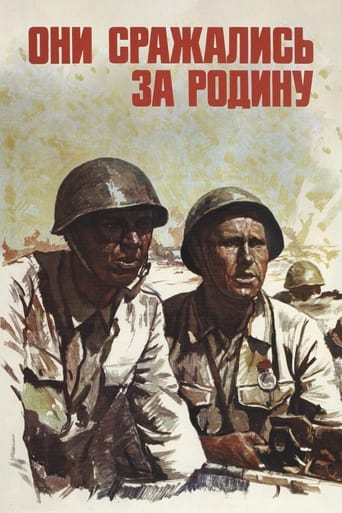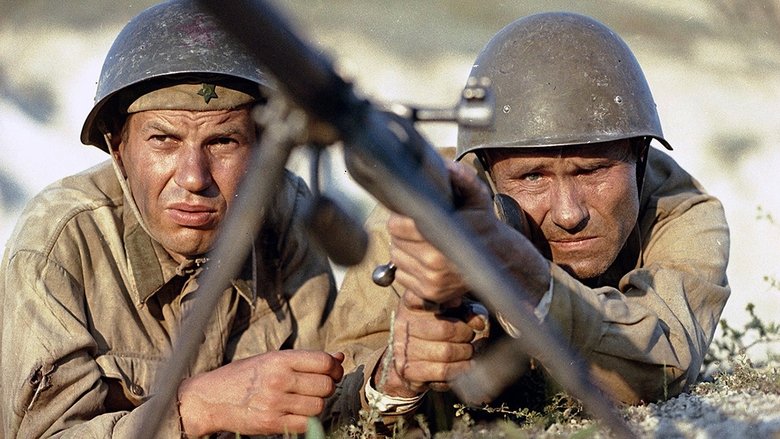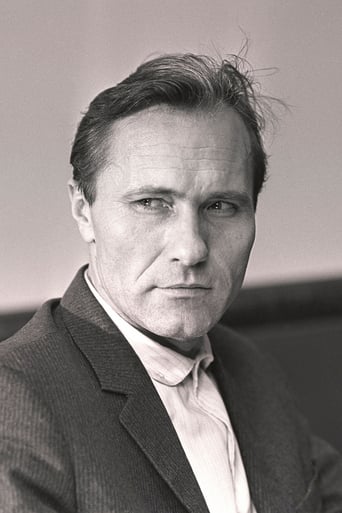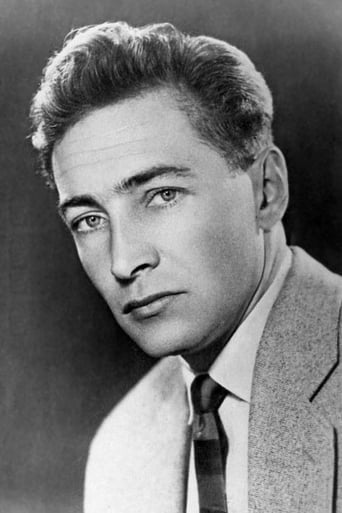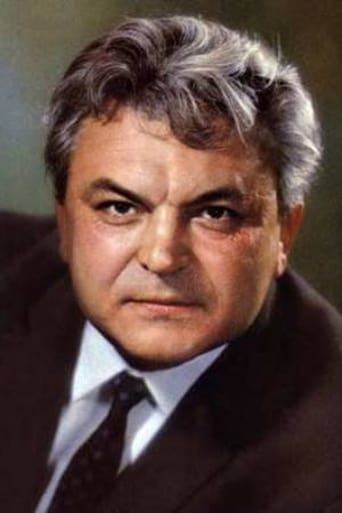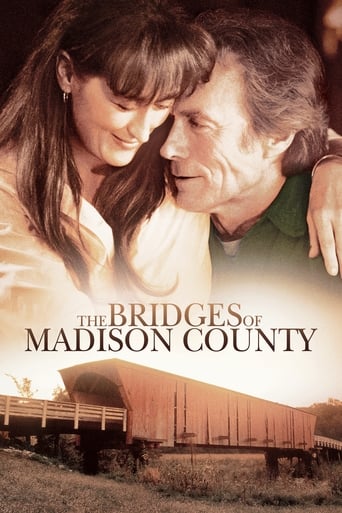They Fought for Their Motherland (1975)
In July 1942, in the Second World War, the rearguard of the Russian army protects the bridgehead of the Don River against the German army while the retreating Russian troops cross the bridge. While they move back to the Russian territory through the countryside, the soldiers show their companionship, sentiments, fears and heroism to defend their motherland.
Watch Trailer
Free Trial Channels
Cast


Similar titles
Reviews
Dreadfully Boring
Fun premise, good actors, bad writing. This film seemed to have potential at the beginning but it quickly devolves into a trite action film. Ultimately it's very boring.
True to its essence, the characters remain on the same line and manage to entertain the viewer, each highlighting their own distinctive qualities or touches.
It really made me laugh, but for some moments I was tearing up because I could relate so much.
"The time is fast approaching when to call a man a patriot will be the deepest insult you can offer him. Patriotism now means advocating plunder in the interest of the privileged classes of the particular State system into which we have happened to be born." - Leo Tolstoy "Heroism on command, senseless violence, and all the loathsome nonsense that goes by the name of patriotism - how passionately I hate them!" - Albert Einstein "Patriotism is a pernicious, psychopathic form of idiocy." - George Bernard Shaw The legendary Sergei Bondarchuk directs "They Fought For the Motherland", a war film set in Russia during the second half of 1942. The film opens with a magnificent shot, a prowling camera gliding through swaying fields of wheat before finding the exhausted Soviet army trudging through a canyon far below. They're in full retreat, having been recently crushed by the invading might of a German Panzer division.We then spend some time with the men, watching as they rest and recuperate. They chat and trade stories, before their commander selects a few for a special mission. Turns out our heroes have been ordered to hold a ridge, their small infantry regiment tasked with holding back the German forces so that their exhausted comrades may withdraw back to Stalingrad, where the Russians are preparing to make an epic final stand. Sam Fuller did this sort of "rag-tag rear guard group of soldiers vs an approaching enemy horde" thing better and with more nuance and complexity, but Bondarchuk is the better visualist. His camera conveys the sheer boredom and exhaustion of these men, and his battle scenes are at times impressive, the expansiveness of the Russian countryside lending his battles a scale which most British and American war productions lack.The film eventually settles down into a predictable rhythm, alternating between giant battles and intimate moments of downtime, Bondarcuk allowing his cast's sentiments, fears and attitudes to gently unfold whenever the bullets aren't flying. The film reduces war to the usual traits - everyman soldiers, fatigue, fear, fun, friendship, boredom, heroism, horror, death, homesickness, cowardice, orders etc – and like most of these films, its attempts at portraying war with "balance" and "truth" can't mask how myopic it ultimately all is. A more poetic version of "Saving Private Ryan", the film was financed by the state and the Russian ministry of defence and serves only to glorify war, heroism, compliance, servitude, and act as a low-key form of propaganda.Like "Saving Private Ryan", the film also ends with sad shots of the Russian flag, close ups of the battered faces of warriors, old men dropping to their knees, utilises various subtle tactics toward propagandistic ends and sports a narrative in which we're manipulated into morning the loss of our everyman heroes, who bravely stood up against foes superior in number. By the time the film ends, a throwaway line urging us to hate our enemies, akin to "Ryan's" nationalistic/militaristic "earn this", goes by almost unnoticed. 7/10 – Worth one viewing.
Russian production. Genre ; WW 2 drama.1975. Based on the novel by Mikhail Sholokhov. Screenplay and direction by Sergei Bondarchuk with Vasili Shukshin ( as Poitr Lopakhin ), Vyaheslav Tikhonov ( as Nikolay Strltsov ), Sergei Bondarchuk ( as Ivan Zvyagintsev ), Georgi Burkov ( as Alexandr Kopytovskij ), Nikolai Gubenko ( as the Lieutenant ), Yuri Nikulin ( as Nekrasov ), Ivan Lapikov ( as Poprischenko ) & Nonna Mordyukova ( as Natalya Stepanova ). The film is based on the book by Nobel Prize winning author Mikhail Sholokhov. The action is set in Russia in July of 1942. The exhausted Soviet army was in full retreat against the might of the invading German Panzer divisions. A decision is to hold a ridge with what is left of an infantry regiment near a small village on the banks of the River Don, to allow the exhausted remnants of the army enough time to withdraw across the river and help fortify Stalingrad for the decisive battle that must come.The loss of Russian life during the campaign was horrific and while there are some impressive set battle pieces, the film concentrates on the exploits of half a dozen or so soldiers from the shattered regiment, who must not retreat even in the face of the Panzers' greater fire power. The film depicts the thoughts and fears of the individual soldiers in the face of the impending battle, and their thoughts of their Mother Russia as well. While the battles rage, the viewer is not only shown the inhumanity of the conflict, but also the strong personal bonds that develop between comrades in arms in a deadly conflict. There is also plenty of humor in the script, even if it is often grim and tinged with violent overtones. Vasili Shukshin ( as Poitr Lopakhin ) takes the acting honors, with a character that is as much larrikin as it is proletariat.
Bondarchuk's big world war 2 film has some excellent scenery (as usual) and is mesmerizingly polished from a pyrotechnic standpoint. The two big battle scenes have lots of cool explosions and mock-up Panzer IV's, but lack focus, drama, and realism. The German soldiers don't seem like they're terribly motivated or even trying that hard. The first battle scene is particularly disappointing in this way - with the German tanks blowing up easily after only one AT rifle shot and the Germans too quick to retreat time and time again. Meanwhile the good Russian freedom fighters take no casualties.Halfway through, the film has a huge battle scene featuring the complete annihilation of a town including a really cool plane crash and explosion. For the next 10 minutes or so the film does no wrong - Bondarchuk himself has a great role as a shell-shocked soldier who bayonet-charges some Germans while artillery goes off everywhere around him. Really cool! The problem is, after that point it's all downhill from there and there's a whole 'nother hour left! This last hour really drags on without much action - just a bunch of boring chit chat.Also, one of the cameras used in the wide battle shots has the dirtiest lens I have ever seen used in a big-budget film. It's totally distracting and ruins what would have been a couple classic battle scenes. What happened?
Its 1942. The war in Russia is going badly for the Russians. They are being slowly pushed back by the ever advancing Nazis. This is the story of a regiment who's slowly dwindling numbers try to survive and remain optimistic as they continue to try to prevent the enemy from ever reaching Stalingrad.This is a great war movie. As with all Sergei Bondarchuk films this is a movie that makes you think and feel by showing you what its like to be a lone man in a huge situation. We get to go inside the heads of the various characters and we see what its like to be in battle. The battle scenes are good as the Russian soldiers simply try to survive the strafing, the bombing and to keep the Germans far enough away that they don't have a good chance at killing them.In someways this film reminded me of Terrence Malicks's Thin Red Line which used similar techniques at times (for example: subjective camera, manipulation of the soundtrack, disjointed flashback.) Actually this movie reminded me of several other war films produced after its release and I'm curious if film makers like Francis Ford Coppola and others studied copies of this all but impossible to see film when they made things like Apocalypse Now.As good as the film is it isn't perfect. The film can come off as a bit too "rah rah" for mother Russia at times, even though the film ultimately speaks to the larger question of defending one's own home land. The film also is a bit unfocused in the second half as the film takes some odd turns; then again the second half has some of its most powerful imagery with the young nurse trying to save the wounded man in the bomb crater and the return of one soldier from hospital.See this movie. Its a great great war war film which only suffers when compared to some of the gems in the Sergei Bondarchuk back catalog of films.

